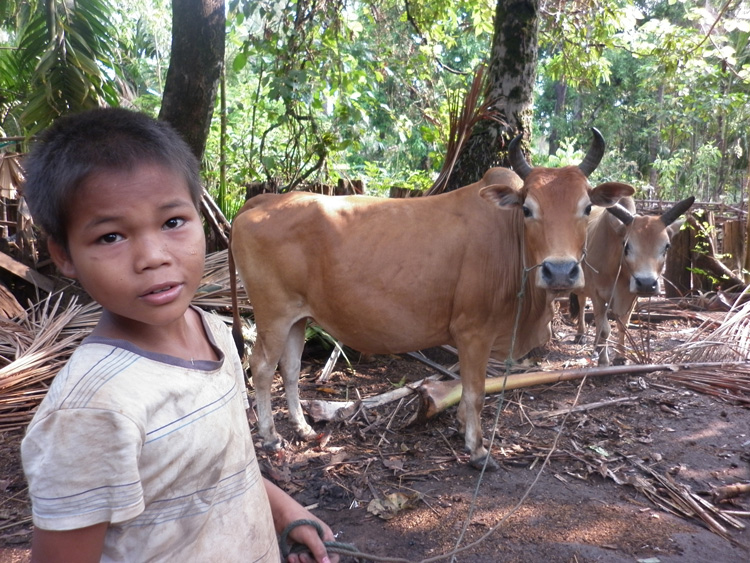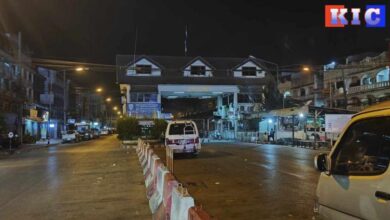I am Tabluklee – the cowboy…

A small Karen boy leads two large brown bulls in search of a much-needed feed of grass. The summer sun has baked the ground hard and dried the grass brittle. The boy is wedged between the huge animals his small frame dwarfed by their bulk. The boy, Saw Tabluklee, blinks against the bright sun, his skin burnt brown and says he loves his job as he can earn enough money for food each day.
“I am happy looking after the bulls. I have food to fill my stomach.”
Saw Tabluklee is a fulltime cowboy. The nine-year-old says he has never been to school. He lives away from home and looks after other people’s bulls for a living.
Speaking without much experience or having been to school, Saw Tabluklee says with bravado that it is better to work.
“I never go to school and I also don’t want to. People who go to school eat rice and people who don’t go to school also eat rice. It is better to get a job and work.”
There are thousands of children like Saw Tabluklee living in rural Burma who are unable to go to school for different reasons. These children have to help their parent work on farms, look after animals cowboy, care for younger children, cook for the family and do numerous other house chores to enable their parents to work on their farms.
Saw Tabluklee says ‘Tabluklee’ means ‘grateful seed’ in Karen. Saw Tabluklee is from Payaraw village that has about 200 households and is in Bilin Township, Mon State. His job is to walk his charges – the two brown bulls – from west to east of the village to look for feed each day.
Saw Tabluklee said that his parents are poor and uneducated but he insists they wanted their children to go to school, but they cannot afford to do so. He says his father lived in monastery for a while and can read and write.
Tabluklee’s father says finding work is hard now that he lost a leg after stepping on landmine. He says it is hard for him to feed his family with the physical limits of having one leg. Tablukee’s father said that the boy tries to help as much as he can and it is a relief and one less of a burden that Tabluklee works for someone else and is able to live on his own.
“He doesn’t visit us much as he stays with the bull owner’s family. Tabluklee said that he is happy there. We are happy for him if he is living well. The family burdens is now less.”
Tabluklee’s mother was keen to study when she was a child, but her parents could not afford to send her to school and instead she stayed home to care for her younger brother. She says she still remembers how her parents beat her with sticks after she was caught carrying her brother on her back so she could listen in to classes at the monastery school.
Tabluklee’s mother looked back on her life and said.
“We were not lucky. Our parents said that females don’t need to attend school. If we can do housework and cook, it is good enough. For us, we do want our kids to attend school, but they don’t want to. As we also face hardship, we don’t force them to attend school.”
Tabluklee parents earn their living by doing farm and daily labor. There are eight members in Tabluklee’s family. Tabluklee is the fifth child out of six. All of Tabluklee’s older brothers and sisters worked to help their parents earn their living.
Tabluklee says he is happy living with the bulls’ owner family. He says that the family is good to him and do love him. Tabluklee says it makes him happy when his boss treats him snacks. When he talks about snacks Tabluklee cannot stop smiling.
“Sometimes, uncle [bulls’ owner] buys me snacks. It is very good. I am happy living with them.”
Looking after the bulls means Tabluklee does not have a chance to play with the other kids in the nearby village except during the school holidays. Tabluklee is too young too realize that his life is hard.
Tabluklee is not the only child who has to work in Payaraw village, there are many other school age children like him who have to work instead of going to school. Many of the boys, like Tabluklee, work as cowboys or work on farms. For girls, they work is usually at home taking care of their younger children and cooking for the family. Payaraw village school finishes at 7th Grade. Children who finish their schooling in the village go on to study in bigger towns like Thaton, Belin, Kyaikto or Rangoon.
Residents say that there have been no more than 10 people who finished high school. The major obstacle to children getting an education is the poverty. Villagers say that the future without an education is bleak for the young generation – they say it is not just a concern for Payaraw village but for Burma.
A villager said that for children like Tabluklee, “their future is like a fading lamp which oil is running out.”
Meanwhile cowboy Tabluklee says he has not got any specific profession in mind for when he reaches adulthood as long as he can work to support his parents.
“I hope that I can work to look after my parents when I grow up. For now, I am still a kid, I can only work as a cowboy to feed my own stomach.”
Burma’s government education ministry says primary education is free but for secondary education, the fees are set between 1,500 Kyat and 2,000 Kyat, but the reality is different. Parents in Burma say the real cost of education makes it expensive to send a child to school. For Tabluklee parents say it would cost more than one year of their earnings to put him through school.
Villagers say the government needs to encourage parents to enroll their children in school, by putting in place a compulsory primary education system that people can afford and to have program that supports children who are unable to afford schooling.




